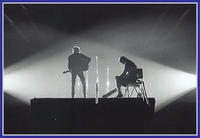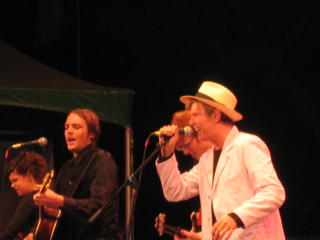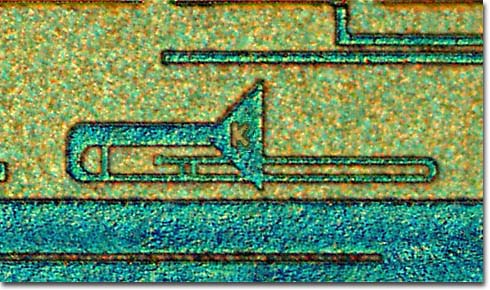 Lee DorseyYes We Can
Lee DorseyYes We Can1970
Lee Dorsey"Riverboat""O Me O Mi O""Games People Play""Occapella"Can you imagine one of your favorite artists making you a mix tape? While maybe not exactly my all-time all-time, a handmade package from Van Dyke Parks would be sweet, me thinks. His knowledge of worldly musics is encompassing and exact (see
The Wire #163 Invisible Jukebox for an example). Add in his production work with the likes of The Mojo Men, Rufus Wainwright, Little Feat, or Cher and it gets more wondrously varied! This is to mention nothing of his co-writing many of the legendarily fractured Beach Boys’
Smile tracks like “Heroes and Villains,” “Cabin Essence,” and “Surf’s Up.”
But why imagine a tape when his actual albums work as mixes of whatever music and themes he happened to be pondering at that point in time? His first,
Song Cycle, spun bluegrass, Stephen Foster, McCarthyism, “Canto a Vera Cruz,” and Ives into a kaleidoscopic, post-colonial Americana head trip. And his second,
Discover America, goes it one better by picking up the shuffling rhythms of Trinidad, Jamaica, and Barbados and dashing them into his pot (literally). It is still distinctly American though, with homage paid to icons like Bing Crosby, the Mills Brothers, J. Edgar Hoover, and New Orleans songwriter Allen Toussaint, with the inclusion of his “Riverboat” and “Occapella.” These two songs always perplexed me over the years, as Parks never seemed to be one to light on the same subject twice. So what was it about these songs that required two nearly-consecutive trips to the bayou?
As wont to do with cover versions on mix tapes, I went looking for the originals. While Toussaint began to step out from behind the console in the early 70’s to sing his own songs, these two selections were still the domain of singer Lee Dorsey. A World War II sailor and featherweight prizefighter by the name of “Kid Chocolate,” Dorsey hooked up with Toussaint (after his own draft duties) after stints for Rex, Fury, and Minit to cut the instant strip-joint anthem, “Ride Your Pony,” for the Amy label in 1966. From that moment forth, Dorsey would be the main vocal conduit for the prolific pen, production, and piano playing of Allen Toussaint. Add to the mix the ultimate practitioners of second-line funk, the Meters, and you have a potent triumvirate of Naw’leans power. While Sundazed has so far reissued both
The New Lee Dorsey and
Ride Your Pony, the pinnacle of this tandem remains the obscure
Yes We Can LP of 1970. Woefully distributed by the overseas Polydor back then, even the CD reissue on Polygram Chronicles is now nearly ten years gone. And it is a shame.
Kicking off with the title track, “Yes We Can” shows Toussaint writing an anthem of sorts, although it stays just shy of being an overtly political song. While not surprising, considering the timeframe, New Orleans music always enjoyed a bit of distance from the rest of the world, focusing more on the good times that comprised life in the Big Easy. That laid-back feeling permeated every aspect of their sound. There is a look out onto the world at large here, but the resulting view is non-judgmental, unaligned neither with revolution nor with the powers that be. There is no rage or riling in sight. Proffered instead is a call for kindness and consideration for the people around you. Even in the midst of the decade end’s upheaval, Lee Dorsey’s voice soothes with his sage-like flow:
Help each man be a better man with the kindness that you give
I know we can make it, I know darn well we can work it out
Yes we can.The bouncing beat, organ swells, “bop ba doo bop” scats, and triumphant horns all reinforce the positive message without a hint of false hope or disbelief in a good outcome. Already the qualities of voice noted by Burke Johnson are evident: “(Dorsey can) project both joy and sorrow and literally take you out on a limb of fantasy, still keeping the intended mood of the composition intact.”
But once the drum kicks in for “Riverboat,” you realize that there is a whole ‘nuther level at work in the music. We are already far down the Mississippi by the time Dorsey bursts in after two measures:
Big wheel justa keep on turnin’
And the fire justa keep on burnin’
Opportunity knockin’, Big Boat justa keep on rockin’It is at once overwhelming and reassuring. The earthy banks and levees are nowhere to be heard, just the Big River itself, and every instrument in Cosimo Matassa’s studio (the ONLY studio in New Orleans at the time) becomes a component of this sound vessel as it cruises the mighty waters. The horns bleat out steam and smoke, the wah guitar warbles like eddies alongside the boat. Drums cycle and churn like pistons, hi-hats hiss, and Dorsey floats on it all, comfortable against such enormous surroundings. Amongst the Big Wheels, Big Boats, and Big Opportunities surrounding and nearly swallowing the passengers on this voyage, it is the miniscule grain of love in his eye that is most important. That cinder renders all these other enormous, uncontrollable elements harmless. Tumultuous as it might be out there, Lee just wants to let you know that there’s a party going on y’all, and as long as we keep cool and stay together, we’ll all flow through this mess without capsizing:
We just keep right on huggin’ ‘n kissin’ ooooh, cuz we got love, yes we haveOther songs comment on the balance between the individual and society. “Who’s Gonna Help Brother Get Further?” addresses the troubles of being poor and predisposed to trouble, and wonders how a person faced with such odds can make it out there. The answer that comes at the chorus is succinctly put: “One Another.” “When the Bill’s Paid” is a similar meditation on economic situations, as Dorsey imagines how easy things will be (for him and his woman) once he is free and clear. The almost-bitter invective of “Games People Play” is the most world-weary of the lot, wondering about the less-pleasant tendencies of human nature and how to deal with them. But even in the face of such negativity, Dorsey and the arrangements that Toussaint surrounds him with never get bogged down by the impending negativity. The buoyancy that laces all these bayou tracks is nothing short of inspiring.
“Tears, Tears, and More Tears” reminisces over the heartbreaking little things of a lost love. From thinking about her first thing in the morning, to the phone call that will never come, the thought of “It’s really over” rises up in his throat as he swallows to hold it back. No more holding hands or drinking wine or speaking sweet nothings, and that absence becomes more concrete as he calls upon the only thing he has, memories, which rends his heart even more. Yet somehow the song is upbeat, as if the continual outpouring of tears will be cathartic, alleviating the heartbreak, and the saddened Dorsey will rise again, cleansed, wiser.
While the heartbreaks have their upside, so do the good times have their troubles as well. With the drunken thuds of bass under him, Dorsey warbles about “hanging out all night long, hanging out till my money’s gone/ O Me O Mi O, what am I gonna do oh?” Despite the ever-present loneliness and dead-ends of night’s pleasurable oblivion of drink, Dorsey somehow sees through to the other side of the tunnel. It’s no blinding revelation or morning-after empty promise, just a simple parry to life’s painful cycles of brief joy and persistent despair: “Another failure, another try. Just keep on trying.” While the world surrounding hits him, floating like a butterfly, and then pounding down again, Kid Chocolate, even with blood on his teeth, just keeps smiling, swinging only as he must. He was undefeated after all.
While dabbling a tad in social issues and breakups, the moments of sheer happiness on the album come to the forefront often and with a rollicking sense of play. From the good-timing indiscretions of “Sneakin’ Sally Thru the Alley” to the raw-funk swamp-pheromone physicality of doin’ the “Gator Tail,” the album also exudes a positivism that is infectious. While the former are bawdy and boisterous, the movement of the other song Parks’ covers, “Occapella” is gentle, though no less delightful with its bubbling spirits:
Pardon me, but you could use it, we’re gonna make a little music
You got soul, why don’t you use it, we’re gonna make a little music
Everything gonna be mellow, we’re just gonna sing it a capella
mmmmmThe percolations of the steel drum in the
Discover America remake are instead the deep waters of the backing voices merging into the song’s very essence: how music (specifically the voice, both solo and merged into chorus) can uplift, empowering the song with that very sound of which it sings. The hmms and ahhs abstract beatifically here, levitating the song to a higher ground that is reverent and festive at the same time. It is that Sound of Joy so often looked for yet lost in secular music!
And what better person to embody that feeling of joy than Lee Dorsey? “If a smile had a sound, it would be the sound of Lee Dorsey’s voice,” Allen Toussaint recalled, “No wonder he inspired so many of my favorite songs.” Van Dyke Parks attempted to harness that same easy feeling so prevalent in New Orleans, showing how even the normally stiff American music can be as laid-back as the multitudinous rhythms of the Caribbean. Not a surprising connection between the two regions then, considering writer Gene Santoro’s remark that: “New Orleans is really a Caribbean city…where music is a more natural part of the cultural fabric than in any other US place.” It is a pleasure worth seeking out the originals (Soul Jazz’s excellent
New Orleans Funk series holds two of the songs found here), so as to experience the sound of Lee Dorsey’s voice and feel the joy and wisdom that it instills on each listen.
[originally published in
Sound Collector Audio Review Issue #3 Summer 2003]













